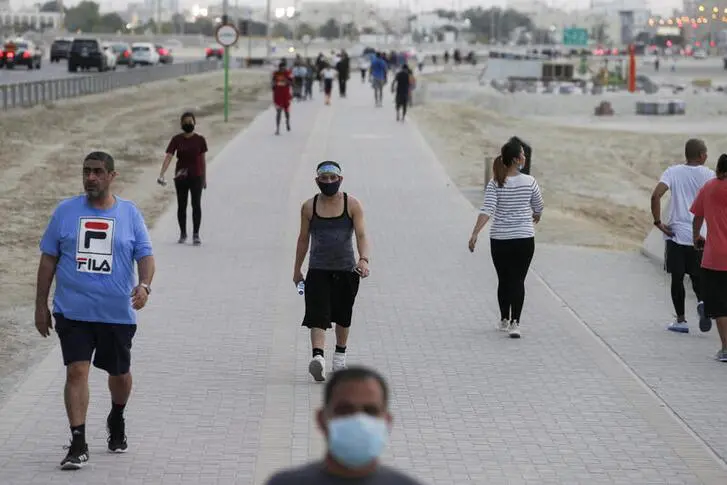PHOTO
Experts have reiterated the need to abide by safety guidelines to avert a second wave of Covid-19 in Bahrain.
An analysis of official statistics in the country reveal that almost 50 per cent of those diagnosed with the virus since July tested positive during random screenings and after developing symptoms.
However, a further 43pc of those tested between July 9 and September 30 were close contacts of those infected.
It implies that those found Covid-19 positive during random testing have led to a surge in local contacts, warned doctors, who reiterated the “#Commit4Bahrain” call.
A representation of Covid 19 cases from July 9 to September 30
According to the Health Ministry’s weekly statistics, 39,936 cases of Covid-19 were registered in Bahrain from July 9 to September 30. Close contacts accounted for 17,087 cases (42.8pc).
A total of 10,508 (26.3pc) tested positive after developing symptoms while 9,188 (23.6pc) were found to be infected during random screening – taking the total to 46.9pc.
Meanwhile, only 2,800 (7pc) tested positive after quarantine and 353 Covid-19 cases were travel-related (0.9pc).
American Mission Hospital chief executive Dr George Cheriyan pointed out the possibility of a “second wave” stressing the need for “patience and persistence” to avert it.
“This analysis means that for every individual that presents with symptoms and tests positive, there is an equal number who are asymptomatic and on random testing or on contact tracing turn out to be positive,” he explained.
“This could lead to higher transmission rates if all of us do not take physical distancing and proper use of face masks seriously.
“We are no way out of the woods as many countries are experiencing a second wave after letting their guard down.
“Unless we have a vaccine or a definitive treatment for Covid-19, the danger remains high, especially for the high risk groups.”
While 837,902 tests were conducted in 84 days, only 4.8pc tested positive.
Bahrain till date has conducted 1,46,8655 Covid-19 tests on its population, however, it remains unclear if the number refers to people or tests conducted in the country.
Sixty-seven pc of them are Bahrainis (26,793) while the remaining 33pc (13,143) are expatriates. Less than one pc of the total cases is travel-related (353) while 99pc (39,583) contracted the disease locally.
Salmaniya Medical Complex chief resident Dr P V Cheriyan pointed out the risk of “close contacts”, echoing the national task force’s call to “reduce mixing”.
“The rise in Covid-19 cases is due mainly to close contacts, hence the importance of social distancing and wearing masks,” he said.
“Crowding in public places and shops should be avoided.
“Till vaccines and antiviral treatments are invented, we have to obey the rules.
“Boosting immunity alone may not help.
“Cases of spread from other unidentifiable causes are negligible and limited.”
The GDN reported last week that Bahrain has witnessed an unprecedented spike in the number of daily new cases from September 3.
Bahraini family physician Dr Hind Al Sindi said the public were taking “precautions too lightly”, which has led to the increase in numbers of those “who turned positive and also unfortunately symptomatic”.
“This sadly takes us a couple of steps behind in terms of numbers and gives us the second peak we were trying to avoid.
“Furthermore it puts a burden economically, financially and medically on healthcare teams who are trying to cope with the current situation and deliver the most optimal quality of care.
“And this is clearly reflected in the high number of recoveries every day.
“If we stand together and commit to Bahrain, we can get the situation under control and resume life as before.”
The GDN reported on Saturday that #Commit4Bahrain campaign has been extended until October 14 to combat the spread of the coronavirus pandemic.
raji@gdn.com.bh
© Copyright 2020 www.gdnonline.com
Copyright 2020 Al Hilal Publishing and Marketing Group Provided by SyndiGate Media Inc. (Syndigate.info).





















